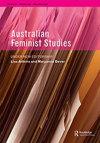Decolonising Mourning: World-Making with the Selk’nam People of Karokynka/Tierra del Fuego
IF 1.3
4区 社会学
Q2 WOMENS STUDIES
引用次数: 11
Abstract
ABSTRACT This article discusses death, mourning and decolonisation, focusing on the Selk’nam of Karokynka/Tierra del Fuego, Chile. Methodologically, it is grounded in feminist experiments of bringing creative and personalised writing into an academic scholarship to challenge subject/object-relations, and to generate platforms for affective, world-making intra-actions and undoings of power. Through collaborative efforts of three differently situated co-authors, using poetic epistolary forms of address, the article unfolds an indigenous centred, feminist, decolonial methodology. Along similar lines, the theoretical approach to death and mourning is pluriversal, transgressing Western epistemologies and ontologies. Through letters, addressed to dead and alive, human and non-human key actors in a revitalising of Selk’nam culture, the article questions ethico-politically in/appropriate ways of mourning the consequences of the necropolitics imposed on the Selk’nam through white colonisation, Western modernity and its colonial matrix of necropower. It is critically addressed how mourning the lost became embedded in colonial discourses of white melancholia and humanism. Moreover combining creative writing methodologies, inspired by feminism, posthumanism, and by indigenous activism and practices of reviving Selk’nam culture, the authors use their different locations to search affirmatively for ways of mourning, which open horizons towards decolonising, cultural revitalising, reclaiming of indigenous rights and philosophies of death and mourning.非殖民化的哀悼:与卡罗金卡/火地岛的塞尔克南人一起创造世界
本文以智利卡罗金卡/火地岛的塞尔克南为研究对象,探讨死亡、哀悼和去殖民化。在方法上,它基于女权主义的实验,将创造性和个性化的写作引入学术研究,挑战主体/客体关系,并为情感、创造世界的内部行动和权力的破坏创造平台。通过三位不同位置的共同作者的合作努力,使用诗意的书信形式的地址,文章展现了一个以土著为中心的,女权主义的,非殖民化的方法。同样,死亡和哀悼的理论方法是多元的,超越了西方的认识论和本体论。本文通过写给塞尔克南文化复兴中的死者和生者、人类和非人类关键角色的信件,以伦理政治的适当方式,对白人殖民、西方现代性及其死亡权力的殖民母体强加给塞尔克南的死亡政治后果提出质疑。它批判性地论述了哀悼逝者如何嵌入到白人忧郁症和人文主义的殖民话语中。此外,作者结合了创造性的写作方法,受到女权主义、后人文主义、土著激进主义和复兴塞尔克南文化的实践的启发,利用他们不同的地点积极地寻找哀悼的方式,为非殖民化、文化复兴、土著权利和死亡与哀悼哲学开辟了视野。
本文章由计算机程序翻译,如有差异,请以英文原文为准。
求助全文
约1分钟内获得全文
求助全文
来源期刊

Australian Feminist Studies
WOMENS STUDIES-
CiteScore
2.50
自引率
0.00%
发文量
7
期刊介绍:
Australian Feminist Studies was launched in the summer of 1985 by the Research Centre for Women"s Studies at the University of Adelaide. During the subsequent two decades it has become a leading journal of feminist studies. As an international, peer-reviewed journal, Australian Feminist Studies is proud to sustain a clear political commitment to feminist teaching, research and scholarship. The journal publishes articles of the highest calibre from all around the world, that contribute to current developments and issues across a spectrum of feminisms.
 求助内容:
求助内容: 应助结果提醒方式:
应助结果提醒方式:


